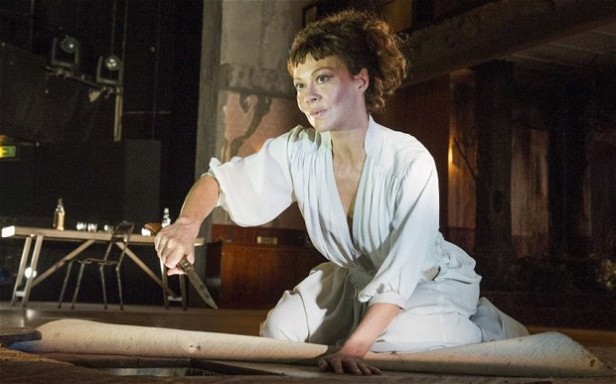
dir. Carrie Cracknell, trans. Ben Power
National Theatre
Screened live in cinemas on 4th September 2014 (I watched at the Cornerhouse, Manchester)
In many of the photographs of the National Theatre’s production, Helen McCrory’s face is caught in a certain light that makes her look as mystical and otherworldly as they come. The pictures seem to capture an eerie intensity in her eyes – mad, powerful, murderous. But in the short film which precedes the live screening of Medea, McCrory tells us that she wants the audience in no doubt that Medea is sane. In motion, she belies the photography – McCrory’s Medea is a stunning and rounded portrait of a desperate woman. From the moment we first hear her deranged screams, to when she staggers into view for a final time, dragging the corpses of her children, the many shades of her performance carry the audience through 90 minutes of escalating tension. Whether manipulating the various male characters by feigning powerlessness, exploring the depths of her furious grief, or plotting punishments for the faithless Jason, McCrory expresses a perfect balance between a performance that is nothing but wild passion, and one that swings from mood to mood without much depth. Her roiling emotions are always there, simply channelled in different ways as the play goes on.
The set is mostly some sort of dreary 1970s flat, all shades of brown and peeling wallpaper, but with a gauzy, misty balcony above where Jason dances with his new bride in slow motion, wafting her beautiful young body around like a puppet, onto which Medea is never allowed to ascend. Her domain instead is the forest that opens out from the back of the stage, where she eventually commits her worst crime, and where she disappears at the end of the play, heaving her sons’ corpses onto her shoulders. In the original, ancient Athenian production of the play, Medea flew off in a chariot provided by her grandfather, the sun-god Helios: she was beyond humanity and so became godlike. In Carrie Cracknell’s vision, Medea is certainly beyond humanity, but the nurse sums up what her future holds in a brief final speech – silence and darkness.
I was utterly sold on the ending and the interpretation of the play, in Ben Power’s unobtrusive translation (often the best thing a translation can be!), and the Chorus are effectively ambiguous, sometimes seeming to egg Medea on, and other times playing the guests at Jason’s wedding, celebrating Medea’s betrayal. Their blank faces, even when performing the twitchy, disjointed-looking movement pieces, are a detached contrast to Medea’s raging emotions, reminding us just how alone she is in her struggles. Of the supporting cast, sadly it’s Danny Sapani’s Jason who doesn’t feel right to me – I can’t quite believe that this sturdy, grey-bearded man could be so naive as to cross Medea, and the possibility of sexual tension between them, which we are shown with a kiss, needs to be more electric. The music is mostly effective: though a bit too obtrusive at times, it is devastatingly powerful in the final scenes. McCrory’s performance, and particularly her performance of the play’s gruesome climax, is rightly the tour de force at the centre of the production – and she takes us all with her on a hell of a ride.
I’ve had another thought about Medea – remembering how often she remarks on the pain of childbirth and how she’s had to suffer bringing her sons into the world, is there a hint that killing them is getting some sort of revenge? Especially as they’re boys and could grow up to be like Jason…
Am I mad?
I could definitely buy into that to some extent – while she may use her femininity as best she can when trying to escape her circumstances, she’s also trapped in the confines of her woman’s role and I think she knows it. She was totally dependent upon Jason, and alienated and debased herself for him by killing her brother and giving him sons, and yet she was fungible to him*, easily replaced by another woman with a better benefits package… And what with the comment Jason makes (although I think it was left out of this translation?) about having remarried in order to give the boys a new family to integrate into, I definitely think that Medea may see them as two little Jason-Creon figures in potentia, and want to stop them from growing up in a world where women are essentially men’s possessions and tools.
I also think that there is potentially a point here about views of childbirth in the ancient world, and how, hate or fear or mock women as men may, they need them to create life… How did the men watching Medea in Ancient Athens think about her view that fighting in a war was much easier than giving birth? Were they sort of respectful/afraid of this difficult, powerful thing women could do and they couldn’t, or did they just think she was a mad, self-absorbed bitch who couldn’t appreciate things from a man’s point of view? Or were they identifying with Medea and empathising with her to some extent? Aah so many questions!
* I really like the word ‘fungible’ and will get it in wherever I can!